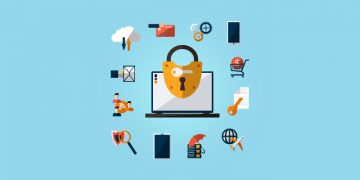New Decade, New You: How to Tidy up Your Devices and up Your Virtual Security Game

How good have you been with keeping up with your New Year’s resolutions? Did they disappear into thin air three days into the New Year? We’re here to remind you that it’s never too late, and you can always start with the things that are the closest to you – your tech gadgets. How long have you been putting off backing up your photos from your phone? How long have you been using the same passwords on your computer? We believe it’s time for some changes. So, we’re bringing a few security tips that will help you turn a new page.
Table of Contents
1) Upgrade passwords to ensure security
Your phones, your computers, and your Internet of Things (IoT) devices are bound to have multiple passwords. Some passwords allow you to access your devices. Some passwords allow you to access multiple accounts through your devices. As boring as it might sound, you DO have to upgrade passwords to ensure security. Password renewal might be a tedious business, but it’s something you have to perform regularly. The longer you use the same password, the more vulnerable it gets. Not to mention that you most definitely have to change the default passwords on your IoT devices.
We do understand that it might be hard to keep track of all your passwords. So, for that, you might want to employ a powerful password manager that will also help you generate strong and unique passwords. Why rack your brain thinking of all those different passwords when a tool can do it for you?
2) Use two-factor authentication
Keeping in mind how pro-active multiple services are about employing two-factor authentication, we’re more or less sure that you have enabled it on most of your accounts. And these security tips are just a small reminder that it’s the best security layer any service can offer at the moment.
With more than just one security token, you would make it harder for hackers to take over your account. Start with securing your email accounts by enabling two-factor authentication. Then go through your social media. Make it harder for criminals to hijack your accounts.
3) Updates matter
There are probably two main reasons why people turn off automatic updates: one, they can be annoying; and two, folks are using pirated programs. But trust us when we say that updates matter. Open any other security tip list and you will see the same suggestion: DO NOT skip automatic updates.
Updates are there to fix issues with your apps and programs. They don’t just upgrade your program’s layout or menu. Every single vulnerability that can be used by hackers gets fixed through the newest updates, so do not skip them.
4) Back up your data
You might think that this security tip is genuinely basic, and you’re actually right. However, we cannot stress enough just how IMPORTANT data back-ups are. It’s not just about backing up the photos from your phone to avoid cluttering the space on your device. It’s also about protecting your data from various infections. Let’s not forget the rampant ransomware epidemic that continues to trouble individual and corporate users around the globe.
Backing up your data might seem tedious, especially if you back it all up on an external device. Nevertheless, you can also create an online backup on a cloud service, where your files would be uploaded automatically each time you create or update them. Please consider that.
5) Delete unnecessary apps and programs
Why keep apps and programs on your devices you do not use? There are probably lots of apps on your phone that you have forgotten after one use. You might wonder what idle apps might have to do with security tips. Well, for one, they take up space. Some mobile apps could have downloaded tons of data onto your device, and it might be clogging your memory.
Also, we have to remember that there is the category of “potentially unwanted programs,” too. It is surprisingly easy to download and install such programs on your computer especially, if you often visit file-sharing pages and other websites full of third-party content. In some cases, people don’t even know they have these programs on-board. How to figure things out? Invest in a security tool that can help you scan your devices. That will definitely speed things up.
6) Clean up your cache
You’ve probably heard the word many times before, but have you ever wondered what cache really is? And how come it made it into this security tip list? Well, to put it simply, cache is a hardware or software component on your device that stores data for future references. For example, the auto-complete function on your browser is directly related to cache and the data it stores.
While it is nice to have faster access to your favorite sites, you don’t really need everything that is stored there. Thus, it is always a good idea to clear your cache regularly, both on your computer and your phone. By doing so, you would enhance your device’s performance because cache tends to slow down your applications.
What’s more, you would mitigate various privacy threats because cache tends to store a lot of personal information, too. For instance, if you’re using the auto-fill option provided by your browsers, the login information is stored in cache. That’s already a privacy threat. Again, it would be safer to store those details in a password manager because a password manager would encrypt that information, and it would be a lot harder to steal it.
All in all, we have to remember that basic security tips are often the most important ones. Think about it in terms of regular flu infection: what’s the use of all those vitamins you’re inhaling if you don’t wash your hands, you know? So, if you have your basic stuff covered, you can be sure that you will definitely improve your gadget and your personal information security. Also, if you have questions about a certain device or a particular app, please feel free to leave us a comment.








